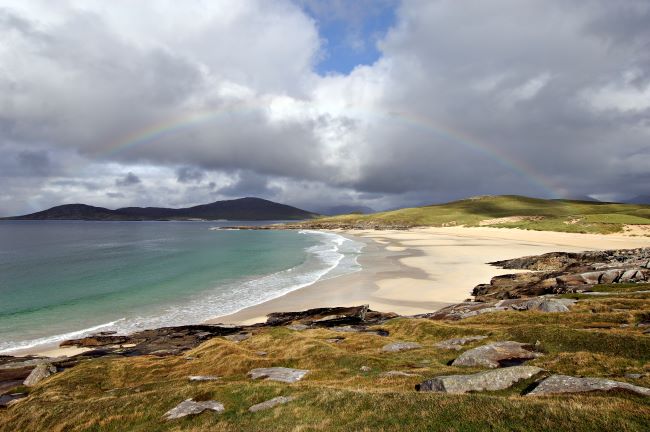Green marine environment fund distributes £3.2m to 45 Scottish projects

A trailblazing marine environment fund – designed to help ensure Scotland’s coasts and seas are healthy, productive and nature-rich – is already having a great impact, after its first two years saw over £3.2m in funding distributed to 45 projects.
Examples of the projects funded around Scotland include improving the ability to rescue stranded marine mammals, using cutting-edge technology to track the health of the marine environment, restoring sand dunes, and improving seagrass beds.
The Scottish Marine Environmental Enhancement Fund (SMEEF) has so far distributed nearly £3.3m, with £2.9m coming from the Nature Restoration Fund, along with almost £400,000 from private finance (led by the offshore wind industry). It is a new financial tool designed to help bridge the green finance gap for Scotland’s marine and coastal environments. The fund enables sectors that use Scottish waters, such as aquaculture, fishing, energy and shipping, to voluntarily contribute to the health and biodiversity of Scotland’s seas by creating a grant pot. This is then distributed to marine nature enhancement projects across the country.
Under the scheme, £33,889 was granted to British Divers Marine Life Rescue for a mobile command and control centre to assist stranded marine animals. For the first time, this gives the rescue team the ability to deploy a vehicle that can support them at a rescue site – this is vital, as 80% of the UK’s mass strandings happen in Scotland.
The Hebridean Whale and Dolphin Trust (HWDT) received over £101,087 to purchase new survey equipment for their sailing vessel, such as hydrophones, acoustic recorders, navigation equipment and cameras. This will allow the best quality data to be collected for years to come, as well as to revamp their citizen science reporting app, Whale Track.
Alison Lomax of HWDT said, “The funding allowed for the first substantial upgrade of the acoustic setup on Silurian since HWDT’s acoustic monitoring began more than 20 years ago. It really has marked a transformative step-change in our capability to assess the changing soundscape of the west coast marine environment and unearth what is potentially causing barriers to nature recovery in Scotland’s seas.”
Examples of other projects funded include £68,897 to the St Andrews Link Trust to support work to recharge and strengthen the dune system to protect against storm floods; £256,852 to the Glasgow Science Centre to create a unique floating reed bed system in the Canting Basin in the Clyde; and £57,188 to WWF Scotland to increase capacity for seagrass restoration.
Net Zero Secretary Mairi McAllan said: “Marine environments across the globe remain under severe threat from both climate change and biodiversity loss. In order to mitigate their destructive effects and protect our marine environment, a collective effort that reaches across all sectors of society will be needed both now and in the future.
“SMEEF is a prime example of effective cooperative action between the public and private sector, backed by responsible, value-led investment contributing towards the shared goal of protecting and enhancing our natural environment.
“I congratulate the projects that have received funding and I look forward to seeing the tangible and lasting impact that they will no doubt have on Scotland’s seas and coastal areas.”
Sarah Brown, SMEEF Project Manager, added: “It’s wonderful to see all these creative and vital projects coming to life, supported with this innovative new type of funding. Our future depends on tackling the nature and climate change crises and our coasts and seas are so important in that fight. This fund supports the recovery and enhancement of our rich marine environment, helping to ensure Scotland’s spectacular coasts and seas are healthy, resilient and productive for future generations.
”We know there are plenty more great projects out there that we would love to support - but we need more funds if we are going to scale up our efforts to recover nature in our seas. Please get in touch if you’d like to help!”
Ronan O’Hara, Chief Executive of Crown Estate Scotland, said: “Crown Estate Scotland is delighted to see this partnership between the public and private sectors delivering positive impacts for Scotland’s precious marine environment.
“The huge variety of projects it has supported will make a difference to the many diverse communities and users of Scotland’s marine environment.
“We would encourage anyone spending time around our coasts and seas to consider donating to enable the continued success of the fund.”
SMEEF is hosted by NatureScot, and managed jointly with core funders, Scottish Government Marine Directorate and Crown Estate Scotland. All donations to the fund are assessed by an Ethical Contributions Board and decisions on which projects to fund are made by a Grants Panel. Both the Ethical Contributions Board and the Grants Panel have independent chairs and include input from Scottish Environment LINK.
For more information and a full list of the projects which have been awarded funding to date, see the SMEEF Impact Report published today to coincide with World Oceans Day.
For more information on SMEEF, including how to make a donation or apply for grant funding, see www.smeef.scot


